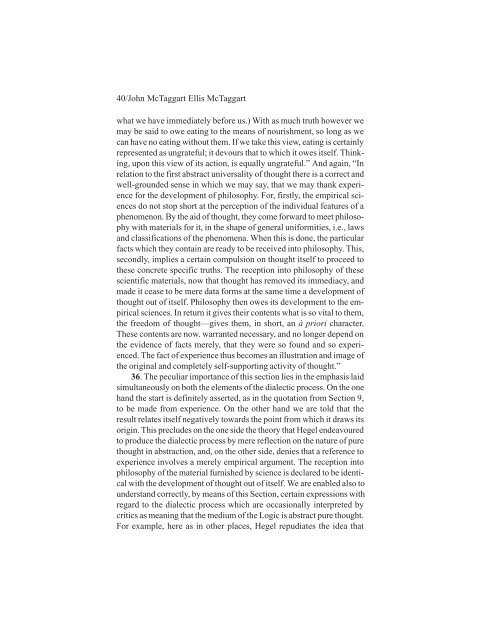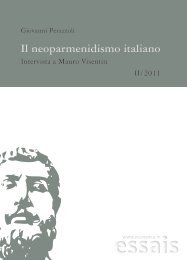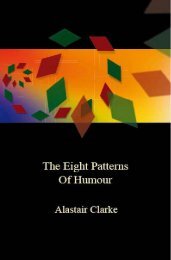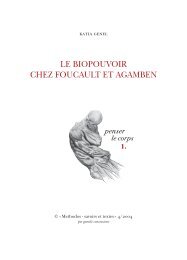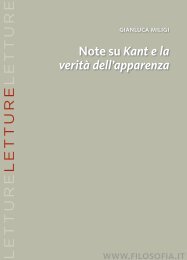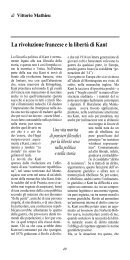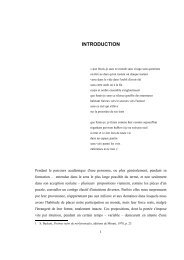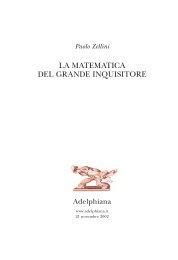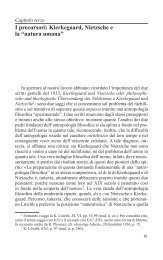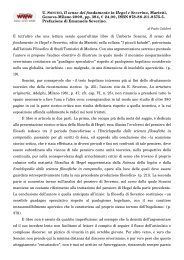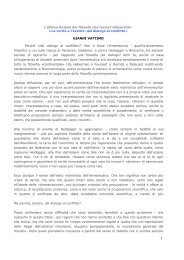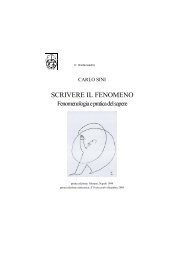McTaggart, Studies in the Hegelian Dialectic
McTaggart, Studies in the Hegelian Dialectic
McTaggart, Studies in the Hegelian Dialectic
Create successful ePaper yourself
Turn your PDF publications into a flip-book with our unique Google optimized e-Paper software.
40/John <strong>McTaggart</strong> Ellis <strong>McTaggart</strong><br />
what we have immediately before us.) With as much truth however we<br />
may be said to owe eat<strong>in</strong>g to <strong>the</strong> means of nourishment, so long as we<br />
can have no eat<strong>in</strong>g without <strong>the</strong>m. If we take this view, eat<strong>in</strong>g is certa<strong>in</strong>ly<br />
represented as ungrateful; it devours that to which it owes itself. Th<strong>in</strong>k<strong>in</strong>g,<br />
upon this view of its action, is equally ungrateful.” And aga<strong>in</strong>, “In<br />
relation to <strong>the</strong> first abstract universality of thought <strong>the</strong>re is a correct and<br />
well-grounded sense <strong>in</strong> which we may say, that we may thank experience<br />
for <strong>the</strong> development of philosophy. For, firstly, <strong>the</strong> empirical sciences<br />
do not stop short at <strong>the</strong> perception of <strong>the</strong> <strong>in</strong>dividual features of a<br />
phenomenon. By <strong>the</strong> aid of thought, <strong>the</strong>y come forward to meet philosophy<br />
with materials for it, <strong>in</strong> <strong>the</strong> shape of general uniformities, i.e., laws<br />
and classifications of <strong>the</strong> phenomena. When this is done, <strong>the</strong> particular<br />
facts which <strong>the</strong>y conta<strong>in</strong> are ready to be received <strong>in</strong>to philosophy. This,<br />
secondly, implies a certa<strong>in</strong> compulsion on thought itself to proceed to<br />
<strong>the</strong>se concrete specific truths. The reception <strong>in</strong>to philosophy of <strong>the</strong>se<br />
scientific materials, now that thought has removed its immediacy, and<br />
made it cease to be mere data forms at <strong>the</strong> same time a development of<br />
thought out of itself. Philosophy <strong>the</strong>n owes its development to <strong>the</strong> empirical<br />
sciences. In return it gives <strong>the</strong>ir contents what is so vital to <strong>the</strong>m,<br />
<strong>the</strong> freedom of thought—gives <strong>the</strong>m, <strong>in</strong> short, an à priori character.<br />
These contents are now. warranted necessary, and no longer depend on<br />
<strong>the</strong> evidence of facts merely, that <strong>the</strong>y were so found and so experienced.<br />
The fact of experience thus becomes an illustration and image of<br />
<strong>the</strong> orig<strong>in</strong>al and completely self-support<strong>in</strong>g activity of thought.”<br />
36. The peculiar importance of this section lies <strong>in</strong> <strong>the</strong> emphasis laid<br />
simultaneously on both <strong>the</strong> elements of <strong>the</strong> dialectic process. On <strong>the</strong> one<br />
hand <strong>the</strong> start is def<strong>in</strong>itely asserted, as <strong>in</strong> <strong>the</strong> quotation from Section 9,<br />
to be made from experience. On <strong>the</strong> o<strong>the</strong>r hand we are told that <strong>the</strong><br />
result relates itself negatively towards <strong>the</strong> po<strong>in</strong>t from which it draws its<br />
orig<strong>in</strong>. This precludes on <strong>the</strong> one side <strong>the</strong> <strong>the</strong>ory that Hegel endeavoured<br />
to produce <strong>the</strong> dialectic process by mere reflection on <strong>the</strong> nature of pure<br />
thought <strong>in</strong> abstraction, and, on <strong>the</strong> o<strong>the</strong>r side, denies that a reference to<br />
experience <strong>in</strong>volves a merely empirical argument. The reception <strong>in</strong>to<br />
philosophy of <strong>the</strong> material furnished by science is declared to be identical<br />
with <strong>the</strong> development of thought out of itself. We are enabled also to<br />
understand correctly, by means of this Section, certa<strong>in</strong> expressions with<br />
regard to <strong>the</strong> dialectic process which are occasionally <strong>in</strong>terpreted by<br />
critics as mean<strong>in</strong>g that <strong>the</strong> medium of <strong>the</strong> Logic is abstract pure thought.<br />
For example, here as <strong>in</strong> o<strong>the</strong>r places, Hegel repudiates <strong>the</strong> idea that


